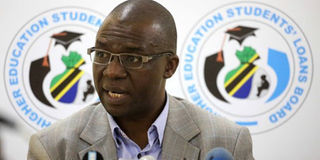Loans board needs to be aggressive and proactive

HESLB's Executive Director Mr. Abdul-Razaq Badru .
What you need to know:
- It is pity that all these beneficiaries have not honoured their contractual obligation. When they received the loans, they all must have been fully aware the taxpayers’ money should work as a revolving fund, meaning that their repayments would be used to provide loans to others. The defaulters appear like they chose to forget this essence.
The Higher Education Students Loans Board (HESLB) has given its borrowers—former students who benefited from loans but have defaulted—a 30-day ultimatum to pay back or risk legal action. This move targets 142,470 defaulters who owe the Board Sh239.3 billion in debts accumulated from 1994/95 to 2005.
It is pity that all these beneficiaries have not honoured their contractual obligation. When they received the loans, they all must have been fully aware the taxpayers’ money should work as a revolving fund, meaning that their repayments would be used to provide loans to others. The defaulters appear like they chose to forget this essence.
Therefore, as a creditor, HESLB has every right to recover money the beneficiaries owe it, and it has the right to send the defaulters to court if they don’t cooperate. However, we need to ask: why did it allow the situation to deteriorate to that level? It is clear that for many years, it hasn’t been rigorous enough when in pursuing those who owe it money.
Apparently, it is after President John Magufuli expressed concern recently, that the Board woke up and started being aggressive—as it should—in hunting down dodgers. It means, the HESLB bears part of the blame on this sorry state in which it finds itself. There are reports of former students who wanted to pay their debts and it appears like there wasn’t much enthusiasm on the part of the Board.
And it looks like the list of defaulters which the HESLB has released was prepared in a hurry, for on it are some names of former students who have already cleared their entire debts.
All this points to one thing: the Board is frantic to prove something to the President who chided it for its failure to collect a lot of money former students owed it. That shouldn’t be the case.
PUSH FOR RENEWABLE ENERGY
Tanzania, like many African countries, is very rich in solar energy potential. The challenge remains that the country only taps a very small percentage of this resource.
This is even as millions of households remain without proper lighting and effective source of energy.
It is very encouraging to learn of the East African Community resolve to increase the contribution of renewable energy to at least 65 per cent of electricity production.
If the goal will be realised, it means over 70 per cent of unlighted homes in Tanzania will be covered. Imagine the kind of transformation these homes would have!
Children living in these homes would be more comfortable study hours; other members of the household would also have more time to engage in income generating activities like making small items that can be sold within and outside the community.
Above all, the use of renewable energy would cut down consumption of expensive and gas emitting sources like kerosene.
People will also become more innovative when there is ample electricity. This means they will find more time and creative ways to use their gadgets like mobile phones.
They will create more content for online consumption and so improve the continent’s share in the area.
So, we encourage leaders in EAC to push for more solar energy.




